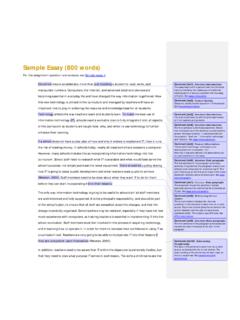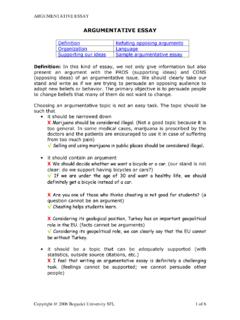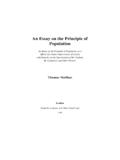Transcription of THE NATURE OF TIME - Julian Barbour
1 THE NATURE OF time (Submitted to the essay competition on 1st December 2008) Julian review of some basic facts of classical dynamics shows that time , or preciselyduration, is redundant as a fundamental concept. Duration and the behaviour of clocks emergefrom a timeless law that governs IntroductionMy library contains four books on mechanics, the science of change in time . Three of them allmodern classics fail to define either time or clocks! Relativity textbooks do discuss time and clocksbut concentrate on only one of the two fundamental problems of time that Poincar e identified in1898 [1]: the definitions ofdurationand ofsimultaneity at spatially separated points. Since then thefirst problem has been remarkably neglected, probably because Einstein s solution of the second in1905 created such failure to discuss duration at a foundational level largely explains the unease many feelwhen confronted with the idea that the quantum universe is static.
2 This suggestion emerged in1967 from a rather high-level attempt to meld Einstein sclassicalgeneral theory of relativity [2]withquantumtheory and has given rise to decades of agonizing over the problem of time . In myview, had duration been properly studied in classical physics, its disappearance in the conjecturedquantum universe would have appeared natural. In this essay I will not discuss quantum theory atall but instead question the standard assumptions made about duration in classical shall develop from scratch a theory of time and clocks, linking it to work that astronomersbegan in antiquity. The best guide to the NATURE of time is the practice of astronomers. Theycannot afford mistakes; a missed eclipse is all too obvious. Moreover, they work directly withconcrete facts, their observations, not obscure metaphysical notions of discussion begins with Newton s comments on astronomical practice in his greatMathe-matical Principles of Natural Philosophy(1687), my only book on mechanics that does discussduration.
3 Newton s discussion leads directly to two key intimately related questions: How can wesay that a second today is the same as a second yesterday? What is a clock? The answers tothese questions, which are seldom addressed at a sufficiently foundational level, will tell us muchabout time and the way the world works. We shall find answers to them by examining successiveimportant discoveries made over two hope the answers to the two questions will persuade you that time as an independent concepthas no place in physics. It arises from something concrete but deeper. As Ernst Mach said (1883)[3]:It is utterly beyond our power to measure the changes of things by time .. time is an abstractionat which we arrive by means of the changes of things; made because we are not restricted toany one definite measure, all being , an admirer, quoted this passage in his obituary of Mach, calling it a gem.
4 Oddly, Ein-stein never directly attempted a Machian theory of time , but in fact such a theory of time withouttime sits hidden within the mathematics of his general theory of relativity [4], the foundation ofmodern classical time -without- time foundation of classical physics entails a relatively small adjustment toour conceptions, but is likely to have a profound effect in a quantum theory of the universe. Thisis because significant parts of classical physics, above all time , are carried over unchanged intoquantum theory. If our ideas about time in classical physics are wrong, surprises can be expectedin a quantum theory of the universe. As of now, little can be said about this with certainty becauseno such theory yet exists. The very idea could even be wrong. Nevertheless, candidate theorieshave been proposed.
5 The one I favour seems initially impossible: the quantum universe happens; there is being but no becoming. The flow of time and motion are I have said, I find this natural, but I shall not here describe my vision of a timeless quantumuniverse presented inThe End of time [5]. Instead, using a few elementary equations and somenew arguments, I wish to strengthen the case for eliminating time as a fundamental concept inclassical physics. The arguments are simple. They strongly suggest that time should be about the NATURE of time is a hard task. Unlike the Emperor dressed in nothing, time isnothing dressed in clothes. I can only describe the The Theory of Newton and the Equation of TimeNo essay on time can omit Newton s magisterial words:Absolute, true, and mathematical time , of itself, and from its own NATURE , flows equably withoutrelation to anything external, and by another name is called duration: relative, apparent, andcommon time , is some sensible and external measure of duration by the means of motion, whichis commonly used instead of true time ; such as an hour, a day, a month, a here implies that in some given interval of true time the universe could do infinitely manydifferent things without in any way changing that interval of time .
6 This view still sits deep in thepsyche of theoretical physicists and only partly exorcized from general relativity. I shall show thatintervals of time do not pre-exist but arecreated by what the universe does. Indeed, Newton canbe hoist by his own petard if we see what his marvelous laws actually tell us start with his concession to practicality: the relative time , which we are forced to use,is found by the means of motion . Moreover, the measures are concrete: shadows mark thehours on a sundial; the moon waxes and wanes; the seasons pass. They are almost as tangible asShakespeare s daisies pied and violets blue that come with the cuckoo. They are all clothes what does Newton tell us about time itself, his ultimate absolute along with space? Canyou get your hands on time ?
7 He is more aware of the question and a potential answer than manymodern authors:Absolute time , in astronomy, is distinguished from relative, by the .. astronomical necessity of this equation, for determining the times of a phenomenon, is evinced as wellfrom the experiments of the pendulum clock, as by eclipses of the satellites of astronomical equation is today called theequation of timeand is the correction thatequalizes hence equation the times measured by the sun or the stars. It is important for myargument and so needs to be explained. The successive returns of the sun and a given star to due1 For readers finding difficulty with Motte s 1729 translation of Newton s Latin,equablymeansuniformlyandsensibleme ansobservable(through the senses).2south at the Greenwich Observatory define thesolarandsiderealdays respectively.
8 The first is onaverage four minutes longer than the second because the sun moves eastward relative to the starsalong the great circle on the sky called theecliptic(eclipses can only occur when the moon too ison the ecliptic). Superimposed on the average sidereal solar difference are two effects. The sun sspeed along the ecliptic (measured by either day) is not exactly constant. This reflects the earth svariable speed in its orbit around the sun. Second, when the sun is high in the sky in the summerand low in the winter, its motion along the ecliptic is purely eastward relative to terrestrial south,and the sidereal solar difference is enhanced compared with the spring and fall, when this is notthe case. The two effects, well known in antiquity, cause solar time to be sometimes ahead andsometimes behind sidereal time by about 15 minutes.
9 Is there some reason to choose one of thesetimes in preference to the other?When Ptolemy wrote theAlmagest, the compendium of ancient astronomy, around 150 CE, heknew no modern laws of motion. In his rudimentary astronomy the sun, moon, planets, and starswere all carried around the earth in curiously different ways. Since the sun outshone everything inthe heavens, dominated life, and governed civil order, he could have taken it to measure time . Infact, he chose the stars; his reason is instructive and marks the first step to a theory of and his great predecessor Hipparchos (who flourished around 150 BCE) had developed atheory of the motion of the sun and the moon around the earth. Its key element was uniformmotion of both the sun and moon around certain circles. It predicted eclipses of the moon withreasonable accuracy provided the motion in the circles was taken to be uniformrelative to siderealtime.
10 Because 15 minutes are significant in eclipse prediction, the sidereal solar fluctuations ruledout the sun as the hand of time . What can we learn from this? In his mind s eye, Ptolemy could see the stars, sun, and moon moving in their circles. It isthe way they move, specifically thecorrelationsbetween their motions, that warrants the introduction of a distinguished measure oftime. Ptolemy s choice of sidereal time to measure duration remained unchallenged for close ontwo is the justification of Newton s comments about the astronomical equation. The earth srotation was still by far the best measure of time in his day, but astronomical knowledge had beengreatly extended, above all by Kepler s laws. The pendulum clock had also been invented, andexperiments confirmed that it and the satellites of Jupiter marched better in step with siderealthan solar time .






